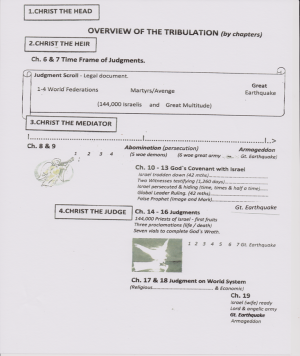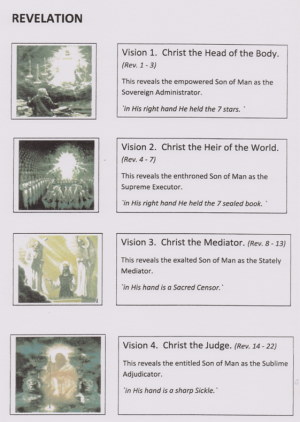I just spent 10 mins trying to find my treatment of Dan 9 but no luck, so I will store this here and under Daniel 9 (the thread).
As
v24 says the 7 redemptive accomplishments of Messiah are completed in the 70 weeks. It is intriguing that this period also includes
closing up prophecy, which is why Christ said in Acts 1 that 'we are not to know' about "the kingdom of Israel." And why no further discussion is found in Acts.
Christ's redemptive death (see
v24) is after the 69th week, which is of course the 70th. Half of this week is the redemptive Gospel, half is destructive (of Israel). His title here is the
Anointed One,
meshiach.
The next person mentioned is '
the ruler who will come (and his people)' of
v26. This is from the earlier visions of ch 2, but is not
the horrible desolating person who is mentioned last and finally. The "ruler who will come" is Rome.
Notice the imperfect tense of 'war will continue to the end' as though it had been going on before the 70th. Quite true. There were various skirmishes (see discussion in Acts 5), but the end of this conflict would be 'like a '
dabar' (destructive flood).' Notice that this is confined to Israel even though the term from Genesis is used.
The term "desolations" gets mentioned before the evil desolator.
The major interpretive difficulty now shows itself--
the antecedent of He in v27a. Remember, the horrible desolating person has not yet been mentioned. He is Christ. "Confirm" is a positive, favorable word choice; a good thing. Daniel is referring to the
new covenant, the one that contains the redemptive treasures of v24. It is for the "many" in the same sense as Is 53's "He will justify many." From the start of Christ's ministry to the solidification of the apostle's teaching is roughly 7 years, and that is the
"confirming."
The middle of the final 7 is
v27b and is the Gospel event, like v24 said, which puts an end to sin (as debt), accomplishes atonement, and brings righteousness in Christ. That's what the first line of v25 meant about 'after' the 69th. The letter to Hebrews makes full discharge of 'an end of sacrifice and offering.'
Ironically, the zealots who took over the temple in the Jewish War ended its sacrifices to save on food; a sort of desperate mirror image "ending of sacrifice" a la Judaizing! It's so tragic! All that death for a system that had been ended!
Then we have
27c and it does have a new
antecedent, as you can see from the commentaries. At the temple, the
horrible desolator would be running the show, and he is the abomination and finally his end overcomes him. Thus Mk 13 and Mt 24 tell us "Let the reader understand" that this is about the zealots who captured Jerusalem and the Temple as a fort. This is the only NT quote of Dan 9 and it is about the
desolator.
He is the desolator of Israel because he insists on fighting the 'ruler who is to come' instead of submitting to God's plan in Dan 2 where the new kingdom comes like a flying stone that turns all worldly kingdoms into a dust that becomes a great new mountain (not Zion) on which the world can worship God.
The NET's notes bt and bu in
v27c explain the shift of antecedent found in the Hebrew; it is the most extensively noted translation:
On the wing[bt] of abominations will come[bu] one who destroys,
until the decreed end is poured out on the one who destroys.”
This person is
not the ruler to come, because 'the rebellion/abomination (Dan 8:13) that desolates' contains its own explanation: it is the rebellion or abomination that desolates the place, even though another army is involved.
The NET shift of antecedent is a better translation than the NIV.
Notice that the desolator is the one whose time is ended, not the ruler who is to come of ch 2.
This is why any overview of the NT must state that the zealot movement is responsible for desolating the country. It's agenda was quite the opposite of the spread of the Gospel of Messiah seen in v24. In Luke, Jesus gave warning after warning to Israel about agitating Rome (chs 11, 13, 15, 17, 19!, 21). At the same time he wanted them to become missionaries of His Gospel. And he tried to do so with 2-3 Galilean zealots, where open revolt had started when he was a child.
Daniel 9's vision is justifiable called the miniature of NT
history.



